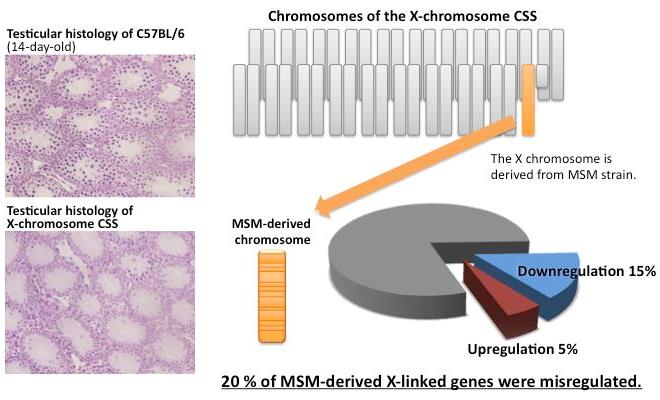X chromosome-autosomes incompatibility accelerates speciation: reproductive isolation by misregulation of X-linked genes
Press release
Evolutionarily Diverged Regulation of X-chromosomal Genes as a Primal Event in Mouse Reproductive Isolation
Ayako Oka, Toyoyuki Takada, Hironori Fujisawa, and Toshihiko Shiroishi PLoS Genet Accepted manuscript online, 2014, doi/10.1371/journal.pgen.1004301Reproductive isolation is important for speciation, because it suppresses free genetic exchange between two diverged populations and accelerates the genetic divergence. Hybrid sterility (sterility in hybrid animals), one of the reproductive isolation phenomena, is possibly caused by deleterious interactions between diverged genetic factors brought by two distinct populations. A mouse inter-subspecific X chromosome substitution strain, B6-ChrXMSM, in which X chromosome of west European subspecies-derived C57BL/6J is replaced by counterpart of Japanese subspecies-derived MSM/Ms strain, shows reproductive isolation characterized by male-specific sterility due to disruption of meiotic entry in spermatogenesis (Oka et al, Genetics, 2004, 2007, 2010). In this study, we conducted comprehensive transcriptional profiling of the testicular cells of this strain by microarray. The results clearly revealed gross downregulation of gene expression in the substituted donor X chromosome. Such misregulation occurred prior to detectable spermatogenetic impairment, suggesting that it is a primal event in reproductive isolation. Furthermore, this misregulation subsequently resulted in perturbation of global transcriptional regulation of autosomal genes, probably by cascading deleterious effects. Remarkably, this transcriptional misregulation was substantially restored by introduction of chromosome 1 from the same donor strain as the X chromosome. This finding implies that one of regulatory genes acting in trans for X-linked target genes is located on chromosome 1. This study collectively suggests that regulatory incompatibility is a major cause of reproductive isolation in the X chromosome substitution strain.
This study was done as a research project “Life Systems” of Trans- disciplinary Research Integration Center, ROIS.

Figure 1. Misregulation of X-linked genes in the X-chromosome substitution strain (CSS). Meiotic spermatocytes were observed in testes of wild type (left upper panel), whereas they were rarely observed in testes of X-chromosome CSS (left bottom panel). Approximately 20% of expressed X-linked genes were misregulated in the X-chromosome CSS.















